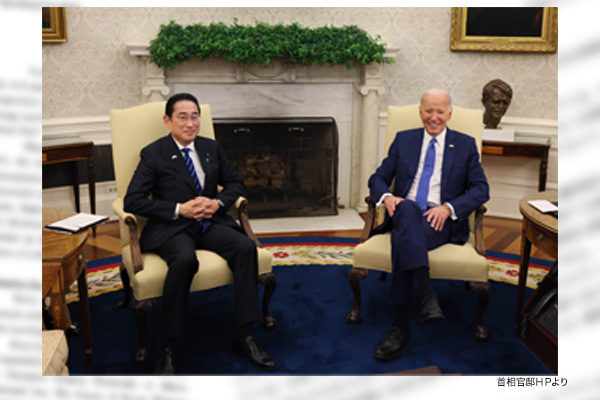“We have become your global partner,” said Japanese Prime Minister Fumio Kishida during his visit to the United States earlier this month. The words carry significant weight. Therefore, in their recent “Speaking Out” columns, Michio Ezaki pointed out the need for constitutional amendments and Fumio Ota for adjusting domestic structures in military terms. Here, I would like to discuss about the aspect of economic security.
Defense industrial cooperation should be government-wide
The joint statement by the leaders of Japan and the U.S. called for deepening defense industry cooperation as part of bilateral security cooperation. The United States has a strong sense of crisis about defense production. Military support for Ukraine has exposed the vulnerability of the declining U.S. production base.
The U.S. Department of Defense released the National Defense Industrial Strategy in January. The purpose of the strategy is to strengthen and modernize the defense industrial base. It is noteworthy that the strategy aims at establishing a modernized defense industrial ecosystem, or an industrial structure in which related companies are organically connected, for “integrated deterrence.” “Integrated” means that military, economic and diplomatic fronts are combined and that the U.S. works together with its allies and partners.
For instance, the strategy calls for constructing resilient and innovative supply chains by integrating traditional defense industry with non-military sectors. “The DoD cannot address the current challenges alone,” the strategy says. It says U.S. allies and like-minded countries should be involved in this effort and economic security should be included.
In this regard, the joint statement included a plan to convene a Forum on Defense Industrial Cooperation, Acquisition and Sustainment (DICAS) for Japan-U.S. defense industrial cooperation. As a U.S. global partner, Japan needs to engage in an intermeshed policy dialogue with the U.S. that aims for integration. To do so, Japan should approach the dialogue with a team that keeps integration in mind. Specifically, the National Security Secretariat should serve as a control tower to assemble a government-wide promotion team involving the Ministry of Defense, the Ministry of Foreign Affairs, and the Ministry of Economy, Trade and Industry.
Japan can also play a role in dealing with the Global South
The integration strategy requires broader participants. During Kishida’s U.S. visit, the first ever Japan-U.S.-Philippines summit took place. As China intensifies its maritime expansion, the U.S. attaches importance to the Philippines in safeguarding maritime order. As a global partner, it is natural for Japan to take advantage of this trilateral framework and enhance deterrence. In preparation for the return of the Trump administration in the U.S., it is important to “institutionalize” a framework that involves Asian countries. Joint coast guard drills in the South China Sea as well as Japanese and U.S. support for Philippine forces were agreed on at the trilateral summit.
Japan is expected to play a role in non-military economic security in addition to such defense cooperation. The materialization of economic security involving Asian countries is necessary along with the institutionalization.
A specific example in this regard is the cooperation in next-generation telecommunications. While Western countries have effectively excluded China’s telecommunications giant Huawei from their telecommunications network, China is utilizing its Belt and Road Initiative to make inroads into emerging and developing countries called the Global South. In order to reverse this trend, collaboration between Japanese and U.S. companies is taking the lead in the next-generation telecommunication technology known as Open RAN, or open radio access network. Japan and the U.S. have agreed to support a plan to test introduce Open RAN in the Philippines.
A strategy to accumulate such economic security projects is required for global partners.
Masahiko Hosokawa is a professor at Meisei University and a former director-general of the Trade Control Department at Japan’s Ministry of Economy, Trade and Industry. He is also a Planning Committee member at the Japan Institute for National Fundamentals.


